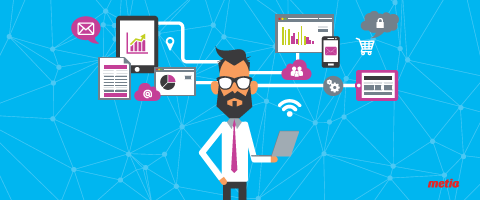How will the changing face of customer loyalty affect your marketing?

Is great customer service really worth the effort? It might seem like a no-brainer, but many businesses struggle with this question. The answer is yes: loyal customers are satisfied customers. They spend more. They return over and over again.
Therefore, succeeding in today's business world requires an intimate understanding of your customers in an effort to build loyalty.
Change is Inevitable as Culture Moves On
Let's take a look at how customer culture has changed over the past decades.
In the 1990s, consumers made decisions based on what organizations offered by looking for the best competitive value in the marketplace. This was considered a "spectator culture." Then, in the 2000s, consumers were invited to be involved in deciding which products and services companies would create. This is where co-creation methods became dominant as a "participation culture." Now we're in a "convergence culture" age, which alters the relationships between existing technologies, industries, markets, genres, and audiences. Consumers are dictating to brands what they need and how they want it.
This shift in culture has completely altered the relationship between consumers and brands. This means customers are rewriting the rules of engagement. They are taking control. Consumers can now design their own Nike shoes and be running in them in four weeks. They can also change their cell phone plan daily or design their perfect car from a blank canvas.
In the convergence era, brands will need to create a loyalty strategy that proves the value of your brand and builds customer confidence and loyalty. Customer loyalty matters because selling more to existing customers is easier and more profitable than finding new ones to sell to.
Want to get up close and personal with your customers?
If loyalty marketing is not currently part of your strategy, here are four steps that will help you change your game plan:
- Get to know your customers deeply in their own context. Consumers are sharing more data than ever before-through social media posts, downloadable content, website browsing, email marketing, and brand communities. In an age of bigger and faster data, it is more important than ever to have the data and tools to be able to listen, engage, and deliver a valued experience. As marketers, we need to ensure we understand where customers spend their time and what information they are most receptive to.
- Inspire customer trust by being consistent and authentic. Authenticity breeds trust and is something you will continually need to earn and build. People really like it when you communicate what your brand believes in, especially when they agree with you. And they're drawn to brands with an original story. Every point of contact with your customer must maintain the same tone and relevance. Customers also respond well to a genuine desire to consistently meet their needs.
- Don't be afraid to get emotional. The way consumers communicate has shifted. Relevant and emotional content boosts satisfaction significantly. Most people believe consumer decision making is based on rational analysis, but it's important to keep in mind that emotions greatly influence and, in many cases, even determine purchasing choices. If brands learn to tell emotional stories, it can be very powerful. It may even transform regular consumers into proud customer advocates. When a brand can make its customers laugh or smile, it is more likely to resonate with the audience, who are then more likely to share your message with their friends, family, and communities.
- Make everything feel effortless. All the little details matter. Once the customer has decided to do business with your brand what follows next will set you apart from the pack. Customers want to feel like brands have thought of everything before they did. It can differentiate you in a good-or not so good-way. Which can make the difference between success and failure. It's not only about delighting your customers, it's also about reducing their effort to resolve a problem. Eliminating barriers and saving customers' time are vital to customer satisfaction. If you can understand your customers' wants, then you can help to fulfill their needs.
Today's smart businesses are gathering, interpreting, and acting upon data to turn it into useful insights and actionable customer loyalty strategies. By delivering exceptional customer experiences, companies can cut through the noise to drive trust, engagement, and loyalty. And once you understand your existing customer, it will make it easier to find similar prospects through predictive analytics.
As digital culture continues to evolve, it will be essential to use a collection of leading social data and analytics tools to ensure you're truly reflecting the language, emotions, and needs of your customers. Are you ready?
